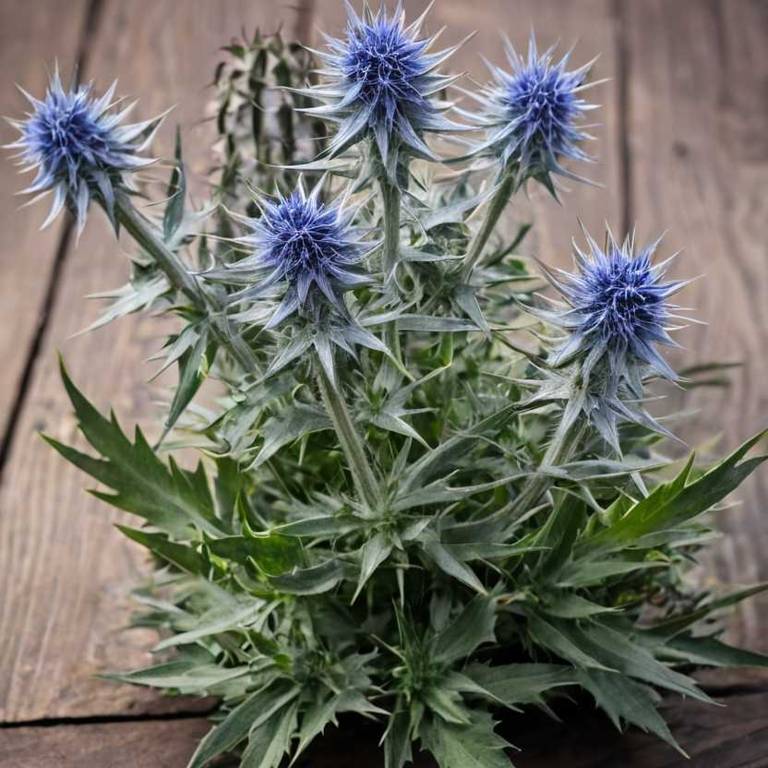Eryngium Maritimum: What To Know Before Using It For Medicinal Purposes

Eryngium maritimum, commonly known as sea holly, has been traditionally used for its medicinal properties due to its rich content of bioactive compounds such as flavonoids, alkaloids, and essential oils.
It has been historically employed in herbal medicine to treat ailments like respiratory infections, digestive issues, and skin conditions, owing to its anti-inflammatory, antimicrobial, and antispasmodic effects. Recent scientific studies have also explored its potential in managing oxidative stress and supporting cardiovascular health, highlighting its therapeutic versatility. The plant's extracts are often used in the form of tinctures, teas, or topical applications to address various health concerns.
Due to its promising pharmacological profile, Eryngium maritimum continues to be a subject of interest in modern herbal and pharmaceutical research.
Health Benefits
Eryngium maritimum has several health benefits, such as its potential anti-inflammatory and antimicrobial properties that may support immune system function.
It is traditionally used in herbal medicine to treat respiratory conditions like coughs and bronchitis due to its expectorant effects. The plant contains compounds that may help in reducing oxidative stress and promoting skin health. Additionally, some studies suggest that it may have a role in managing diabetes by improving insulin sensitivity.
Overall, Eryngium maritimum is valued for its diverse therapeutic applications in traditional and complementary medicine.
10 Best Health Beneift of Eryngium maritimum
Bioactive Constituents
Eryngium maritimum has several bioactive constituents, such as flavonoids, alkaloids, and terpenoids, which contribute to its medicinal properties.
These compounds exhibit antioxidant, anti-inflammatory, and antimicrobial activities, making the plant a potential source for natural therapeutic agents. Flavonoids like quercetin and kaempferol are known for their ability to neutralize free radicals and protect cellular structures. Alkaloids in Eryngium maritimum may possess analgesic and antispasmodic effects, supporting its traditional use in treating ailments like stomach cramps and inflammation.
The presence of these bioactive constituents underscores the plant's value in both traditional medicine and modern pharmacological research.
Medicinal Preparations
Eryngium maritimum has several medicinal preparations, such as teas, tinctures, and topical salves, that have been traditionally used for their purported health benefits.
A common method of preparation involves making a tea by steeping the dried leaves and flowers in hot water, which is believed to aid in digestive health and respiratory support. Tinctures are also made by soaking the plant material in alcohol to extract its active compounds, often used for their anti-inflammatory and analgesic properties. Topical applications, such as salves or poultices, are applied to soothe skin irritations and reduce inflammation.
While these preparations have historical use, it is important to consult with a healthcare professional before using Eryngium maritimum for medicinal purposes.
Side Effects
Eryngium maritimum can have some side effects, such as gastrointestinal discomfort, including nausea, vomiting, and diarrhea, especially when consumed in large quantities.
It may also cause allergic reactions in individuals sensitive to plants in the Asteraceae family, leading to skin rashes or respiratory symptoms. Prolonged use or high doses might interfere with liver function, potentially leading to hepatic toxicity. Additionally, the plant contains compounds that can irritate the mucous membranes, causing throat irritation or a burning sensation.
It is important to consult a healthcare professional before using Eryngium maritimum, especially for those with pre-existing health conditions or taking other medications.